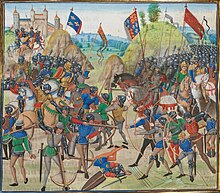Portal:History
The History Portal
History is the systematic study of the past. As an academic discipline, it analyzes and interprets evidence to construct narratives about what happened and explain why it happened, focusing primarily on the human past. Some theorists categorize history as a social science, while others see it as part of the humanities or consider it a hybrid discipline. Similar debates surround the purpose of history, for example, whether its main aim is theoretical, to uncover the truth, or practical, to learn lessons from the past. In a slightly different sense, the term history refers not to an academic field but to the past itself or to individual texts about the past.
History is a broad discipline encompassing many branches. Some focus on specific time periods, such as ancient history, while others concentrate on particular geographic regions, such as the history of Africa. Thematic categorizations include political history, social history, and economic history. Branches associated with specific research methods are quantitative history, comparative history, and oral history.
Historical research relies on primary and secondary sources to reconstruct past events and validate interpretations. Source criticism is used to evaluate these sources, assessing their authenticity, content, and reliability. Historians integrate the perspectives of several individual sources to develop a coherent narrative. Different schools of thought, such as positivism, the Annales school, Marxism, and postmodernism, have distinct methodological implications.
History emerged as a field of inquiry in the ancient period to replace myth-infused narratives, with influential early traditions originating in Greece, China, and later also in the Islamic world. Historical writing evolved throughout the ages and became increasingly professional, particularly during the 19th century, when a rigorous methodology and various academic institutions were established. History is related to many fields, including historiography, philosophy, education, and politics. (Full article...)
Featured picture
Did you know (auto generated)

- ... that the U.S. National Firefighter Registry will match state cancer data with voluntarily collected work history data from firefighters?
- ... that officials said this year's Louisiana wildfire season includes the largest wildfire in the state's history?
- ... that Galena Schoolhouse in South Dakota was once leased to a historical society for $1 annually?
- ... that the historical-romance novel My Tender Matador includes a fictionalized version of the attempted assassination of Augusto Pinochet?
- ... that the Oxtongue River, historically a canoe route for indigenous people, is still used for recreational canoeing?
- ... that in 88 BC, Lucius Cornelius Sulla carried out the first coup d'état in Roman history?
Abū Bakr Muḥammad ibn Ṭughj ibn Juff ibn Yiltakīn ibn Fūrān ibn Fūrī ibn Khāqān (8 February 882 – 24 July 946), better known by the title al-Ikhshīd (Arabic: الإخشيد) after 939, was an Abbasid commander and governor who became the autonomous ruler of Egypt and parts of Syria (Levant) from 935 until his death in 946. He was the founder of the Ikhshidid dynasty, which ruled the region until the Fatimid conquest of 969.
The son of Tughj ibn Juff, a general of Turkic origin who served both the Abbasids and the autonomous Tulunid rulers of Egypt and Syria, Muhammad ibn Tughj was born in Baghdad but grew up in Syria and acquired his first military and administrative experiences at his father's side. He had a turbulent early career: he was imprisoned along with his father by the Abbasids in 905, was released in 906, participated in the murder of the vizier al-Abbas ibn al-Hasan al-Jarjara'i in 908, and fled Iraq to enter the service of the governor of Egypt, Takin al-Khazari. Eventually he acquired the patronage of several influential Abbasid magnates, chiefly the powerful commander-in-chief Mu'nis al-Muzaffar. These ties led him to being named governor first of Palestine and then of Damascus. In 933, he was briefly named governor of Egypt, but this order was revoked after the death of Mu'nis, and Ibn Tughj had to fight to preserve even his governorship of Damascus. In 935, he was re-appointed to Egypt, where he quickly defeated a Fatimid invasion and stabilized the turbulent country. His reign marks a rare period of domestic peace, stability and good government in the annals of early Islamic Egypt. In 938 Caliph al-Radi granted his request for the title of al-Ikhshid, which had been borne by the rulers of his ancestral Farghana Valley. It is by this title that he was known thereafter. (Full article...)
On this day
February 7: Independence Day in Grenada (1974)

- 1365 – Albert, King of Sweden, granted a town charter to Ulvila, the third-oldest city in Finland.
- 1813 – Napoleonic Wars: Two evenly matched frigates, the French Aréthuse and the British Amelia, battled to a stalemate (depicted) at the Îles de Los off the Guinean coast.
- 1865 – The trustees of Seattle enacted an ordinance that expelled Native Americans from the newly incorporated town.
- 1900 – Second Boer War: British troops made a third unsuccessful attempt to lift the siege of Ladysmith in the Battle of Vaal Krantz.
- 2014 – Researchers announced the discovery of the Happisburgh footprints in Norfolk, England, the oldest known hominid footprints outside Africa, at more than 800,000 years old.
- Alfonsina Orsini (d. 1520)
- Margaret Fownes-Luttrell (b. 1726)
- Louisa Jane Hall (b. 1802)
- Anne Morrow Lindbergh (d. 2001)
Selected quote
There cannot be two suns in the sky, nor two emperors on the earth.
— Confucius, Chinese Sage and Philosopher
Related portals
More Did you know...
- ... that the Japanese aircraft carrier Amagi (wreck pictured) capsized on 29 July 1945 as a result of cumulative damage inflicted by American airstrikes on 24 and 28 July?
- ... that Scandinavian influence in Scotland, still evident today, was probably at its height during the time of Thorfinn the Mighty?
- ... that, after the 2003 invasion of Iraq, the Bassetki statue, which is more than 4,200 years old, was found in a cesspool?
- ... that in medieval art, angels were often depicted wearing feather tights?
- ... that 49% of German military losses happened in the last 10 months of the Second World War in Europe?
- ... that Joshua L. Goldberg, the first rabbi to serve as a World War II U.S. navy chaplain, was a Russian army deserter?
- ... that Richard Nixon chose the Wilson desk as his Oval Office desk because he believed it was used by Woodrow Wilson, informed that it was used by Henry Wilson, Vice President under Ulysses S. Grant, but actually bought by Garret Augustus Hobart, 24th Vice President of the United States under President William McKinley?
- ... that some of the nominally silver Roman coins from the Bredon Hill Hoard only have a 1% silver content?
Topics
Categories

History • By period • By region • By topic • By ethnic group • Historiography • Archaeology • Books • Maps • Images • Magazines • Organizations • Fictional • Museums • Pseudohistory • Stubs • Timelines • Chronology • People • Wikipedia historians
WikiProjects
![]() WikiProject History •
Ancient Near East • Australian History • Classical Greece and Rome • Dacia • Former countries • History of Canada • Chinese history • European history • Heraldry and vexillology • Indian history • Jewish history • Medieval Scotland • Mesoamerica • Military history • Middle Ages • History of Science
WikiProject History •
Ancient Near East • Australian History • Classical Greece and Rome • Dacia • Former countries • History of Canada • Chinese history • European history • Heraldry and vexillology • Indian history • Jewish history • Medieval Scotland • Mesoamerica • Military history • Middle Ages • History of Science
WikiProject Time • Days of the Year • Years
WikiProject Biography • Composers • Political figures • Saints • United States Presidents
Things you can do
 |
Here are some tasks awaiting attention:
|
Associated Wikimedia
The following Wikimedia Foundation sister projects provide more on this subject:
-
Commons
Free media repository -
Wikibooks
Free textbooks and manuals -
Wikidata
Free knowledge base -
Wikinews
Free-content news -
Wikiquote
Collection of quotations -
Wikisource
Free-content library -
Wikiversity
Free learning tools -
Wiktionary
Dictionary and thesaurus




















































